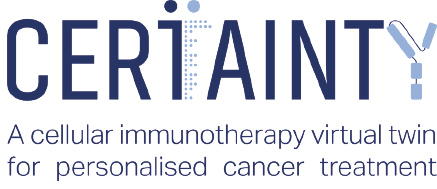Virtual twin to improve treatment with cancer immunotherapies
An international team started the research project CERTAINTY in December 2023. Together with partners from science, industry and the healthcare sector, the project team led by the Fraunhofer Institute for Cell Therapy and Immunology IZI aims to develop a virtual twin that will improve treatment with personalized cancer immunotherapies in the future.

In recent years, cancer immunotherapies have established themselves as a further pillar of medical oncology alongside traditional treatment options (surgery, radiotherapy and chemotherapy). The advantages of personalized treatment approaches, such as CAR-T cell therapy, also include more precise phenotyping of individual patients.
Numerous clinical, imaging, molecular and cell analytical data are collected and processed for each patient for diagnosis, treatment decisions and follow-up. The totality of all patient data within a clinical picture harbors enormous potential for improving diagnosis and therapy for future patients. One approach to realizing this potential is the concept of the virtual twin. This involves merging certain molecular and cellular characteristics of a person and their clinical progression data into a digital representation, which is regularly updated using a series of data variables. Based on comparative data from patients with similar characteristics, the virtual twin can then be used to simulate prognoses regarding the course of the disease or various treatment options.
Corresponding concepts for virtual twins and the first promising models already exist in the field of cardiovascular diseases. In the EU project CERTAINTY, modules are now to be developed for a corresponding virtual twin for the treatment of cancer patients with CAR-T cell therapies. This will support doctors in selecting the best possible therapy in the future and also relieve the burden on the healthcare system through the more efficient use of cost-intensive drugs.
The virtual twin will initially be developed as an example for multiple myeloma (MM), a malignant disease of the bone marrow. The plan is for it to comprehensively reflect the individual pathophysiology of patients who are eligible for or undergoing cellular immunotherapies and to be updated regularly. A particular focus is on the integration of molecular patterns into the digital representation. Other key technologies include the collection and processing of large amounts of data (big data processing), machine learning, personalized in vitro models and software-supported mechanistic models. Another focus of work is the development of interfaces that ensure data access and interaction between different physical and digital systems, always taking data protection into account.
Other aspects taken into account in the project are the integration of socio-economic factors that can influence the course of the disease, as well as future applications for patients.
In addition to leading the project, the Fraunhofer IZI is contributing its expertise in the field of personalized medicine and molecular diagnostics. Within the project the institute will develop digital computational models that can be used to identify individual disease progressions using molecular or genetic patterns of patients or CAR-T cells.
Project coordinator Dr. Kristin Reiche, head of the Bioinformatics Unit at Fraunhofer IZI, explains: "For CERTAINTY, we will build on existing computer-aided models of human biology. We want to combine these with novel models for genetically modified immune cells such as CAR-T cells in order to model the individual course of disease and therapy for patients".
The EU consortium "CERTAINTY - A cellular immunotherapy virtual twin for personalized cancer treatment" is being funded by the European Union with almost EUR 10 million over the next 4.5 years.
Partners
- Fraunhofer-Gesellschaft, Germany
- Fraunhofer IZI (project coordination)
- Fraunhofer SCAI
- Fraunhofer IMW
- University of Leipzig Medical Center, Germany
- Singleron Biotechnologies GmbH, Germany
- Collaborate Project Management, Germany
- Myeloma Patients Europe AISBL, Belgium
- TriNetX Oncology GmbH, Germany
- Masaryk University, Czech Republic
- Information Technology for Translational Medicine, Luxembourg
- University Hospital of Würzburg, Germany
- Institut Curie, France
- University of Namur, Belgium
- Universitair Medisch Centrum (UMC) Utrecht, The Netherlands
- Charité - Universitätsmedizin Berlin, Germany
- European Society for Blood and Marrow Transplantation (EBMT), The Netherlands
- HealthTree Foundation, USA
- Roche Pharma AG, Switzerland
Funding

Funded by the European Union. Views and opinions expressed are however those of the author(s) only and do not necessarily reflect those of the European Union. Neither the European Union nor the granting authority can be held responsible for them.
